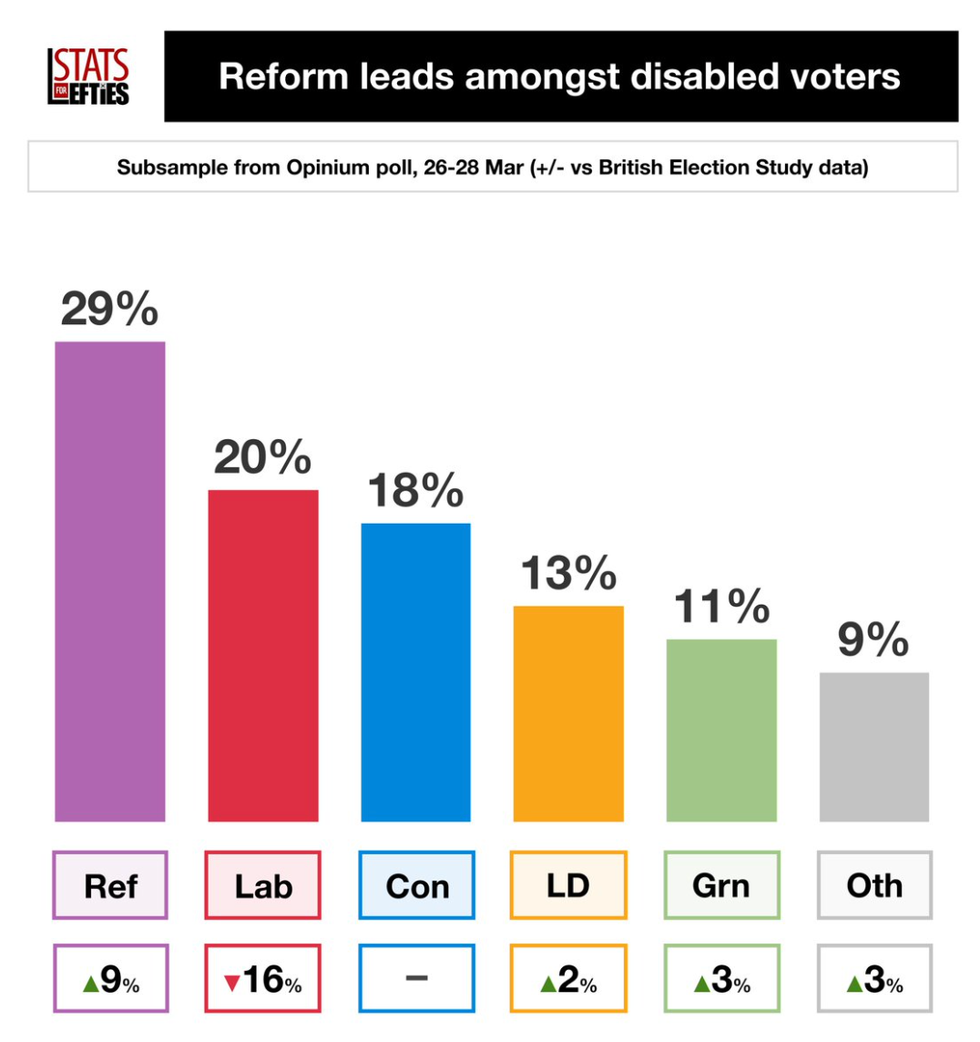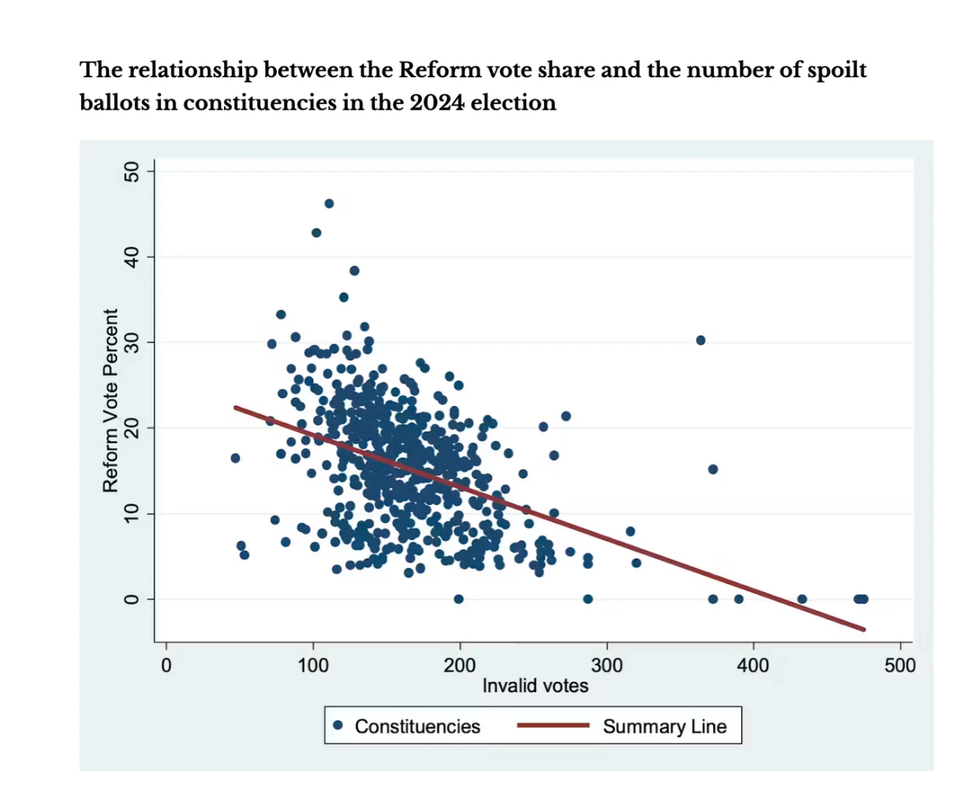With Reform UK leading among disabled voters, three charts hint at a ticking time bomb for Labour
Disabled people, who have consistently been found to have lower levels of political participation, rallied behind Nigel Farage's party at the last General Election
Don't Miss
Most Read
Trending on GB News
Reform UK is the most popular party among disabled people, putting them ahead of Labour, a recent poll on voter intention shows.
The surge comes after Work and Pensions Secretary Liz Kendall announced plans to tighten the eligibility criteria for PIP last month, aiming to reduce the welfare bill by £5billion annually by 2030. This proposal could result in approximately one million fewer individuals qualifying for disability benefits.
The move sparked a furore among the disabled community, with James Taylor, executive director of strategy at disability charity Scope branding Labour's move a "catastrophe" that would "penalise some of the poorest people in our society”.
New polling on voter intention suggests Reform UK is benefiting from the backlash as Nigel Farage's party is leading among disabled voters as Labour's support crashes (see chart below).

Reform UK is the most popular party among disabled people, putting them ahead of Labour
Stats for Lefties
Opinium's latest poll split voters into "has a disability" (407 respondents) and "does not have a disability" (1000).
A subsample from the poll, conducted from 26-28 March puts Reform at 29 per cent while Labour trails behind at 20 per cent.
The Conservatives were the third most popular option among disabled voters at 18 per cent, followed by the Liberal Democrats and the Green Party at 13 and 11 per cent respectively.
When compared to British Election Study data at the last General Election which asked voters: "Are your day-to-day activities limited because of a health problem or disability?", Labour has fallen 16 percentage points from a high of 36 per cent, while Reform is up nine per cent on the vote share it achieved on July 4.
Eagle-eyed observers will notice that Reform's vote share was high at the last General Election, coming second only to Labour on 20 per cent.
There are many possible explanations for Reform's appeal to disabled voters. Disabled people are diverse and influenced by various factors, including personal experiences, policy priorities, and regional contexts.
Also, the backlash towards Labour is in line with broader public opinion. For example, a new survey for the More in Common non-profit organisation has found that the majority of the public does not support the proposed cuts to personal independence payment (PIP).
However, when viewed in the context of several research papers, a pattern emerges among disabled voters that suggests trouble could be brewing for Labour at the ballot box, with Reform being the chief beneficiary.
For example, Reform's surge among disabled people on July 4 is striking because this group has consistently been found to have lower levels of political participation.
Ahead of the General Election, the national disability charity Sense found nearly half (47 per cent) of disabled people in the UK felt that they aren’t important to political parties, with one in four (26 per cent) not optimistic that life will improve for disabled people under a new government (see chart above).
This apathy among the disabled is supported by research published in January, which found this subset of the population is more likely to reject the mainstream and support protest movements.
Given Reform is an insurgent party that's trying to break the stranglehold of the Conservatives and Labour, this preference for an outsider could potentially play to Farage's strengths in 2029.
This is not a foregone conclusion as the research paper by Ralph Scott at the University of Bristol and Melanie Jones at Cardiff University also found that disabled people are less likely to support parties to the political right.
However, research by Paul Whiteley, Professor of Government at the University of Essex, into the voting behaviour on July 4 found that there was a strong negative relationship between the share of a constituency vote that went to Reform and the number of ballots spoiled in that constituency (see chart below).

Research shows strong negative relationship between the share of a constituency vote that went to Reform and the number of ballots spoiled in that constituency
P Whiteley
CC BY-ND
In other words, where people were voting for Reform, fewer people were spoiling their ballots.
This is significant as research shows that voters who spoil their ballots can be classified into two categories: those who simply make a mistake when filling in the ballot and those who are protesting about the current system.
As Professor Whiteley explains, in countries with complex electoral systems, accidental errors are more common. However, Britain’s first-past-the-post system, where voters select just one candidate, minimises this issue due to the straightforward nature of its ballots.
As a result, most spoiled ballots in the UK tend to be deliberate acts of protest, often expressed through blank ballots, write-in names, or even critical messages directed at parties and candidates.
The implication here is that Reform gained votes from individuals who might otherwise have chosen to spoil their ballots or abstain from voting altogether.
Given that disabled people are prone to voter apathy, Reform may have galvanised a subset of them to get out and vote last year.
With Labour's support crashing among the disabled, Farage's insurgent party could get a stronger showing next time around.
However, the politics of grievance only gets you so far. As elections guru John Curtice recently put it to GB News, Reform still largely operating in a "niche market".








